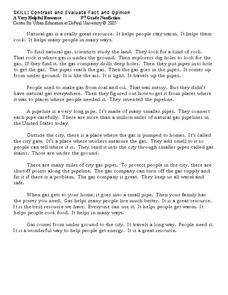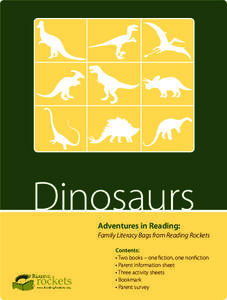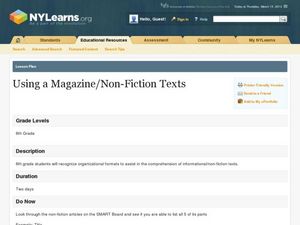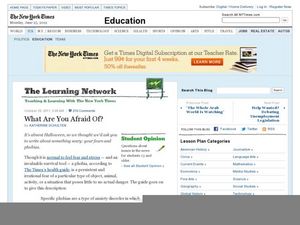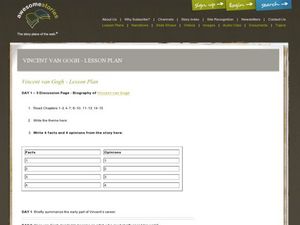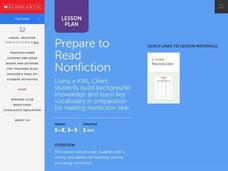Curated OER
Bias and Crime in Media
Critical thinking and social justice are central themes for this resource on bias and crime in media. The class views and discusses an incisive PSA that highlights assumptions based on race. Small groups read newspaper opinion pieces...
Curated OER
Ready-Set-Go-Whoa!
The Apaches: People of the Southwest offers readers a chance to employ the “Ready-Set-Go-Whoa!” strategy (an adaptation of the KWL) to test what they know and summarize what they learn as they read Jennifer Fleischner’s nonfiction...
DePaul University
Contrast and Evaluate Fact and Opinion
Looking for a resource that helps learners practice identifying fact and opinion? A four-page worksheet includes two informational text reading passages. Pupils read each passage and respond to four multiple choice and one short answer...
PBS
Reading Adventure Pack: Dinosaurs
Two books—Dinosaurs by Gail Gibbons and Danny and the Dinosaur by Syd Hof—begin a learning experience in which scholars complete three creative, imaginative, and real-world activities. First, pupils create a puzzle featuring their...
Turabian Teacher Collaborative
Parts of Argument II: Article Critique
Break down the parts of argumentative writing with a critical thinking activity. High schoolers read an article of your (or their choice), and use a graphic organizer to delineate the ways the author structures his or her arguments.
EngageNY
Reading for Fluency: Readers Theater about the Rainforest (Page 33)
Lights, camera, action. Scholars use page 33 of The Most Beautiful
Roof in the World to create a readers theater. They work in triads and use sticky notes to mark and create their own speaking parts from sections of the text. They then...
Polk Bros Foundation
Meet the Nonfiction Main Idea Challenge
Help your class develop the ability to determine a main idea with a packet of materials that you can introduce and use over a period of time. The packet includes some information for the teacher and rationale for the exercises. There are...
Curated OER
Using a Magazine/Non-Fiction Texts
Working with magazine articles and other informational texts, students identify the parts of a non-fiction work. The learners use SMART board files to guide instruction, as well as a transition to writing their own non-fiction article in...
Curated OER
Using Details from Nonfiction Text to Organize Sequence of Events
Is it important to do things in a certain order? Yes, especially when making a peanut butter and jelly sandwich. Or so your class will learn in a lesson plan on sequencing. After guided practice, class members generate their own “how-to”...
Polk Bros Foundation
I Can Identify a Nonfiction Writer's Main Idea and Supporting Examples
Use this page to quickly identify the central idea of a text and organize ideas for writing an informational or explanatory text. The worksheet is split into two parts. In the first part, pupils note down the main idea and supporting...
Read Works
Signal Words in Expository Text
Signal words are one way that authors make the relationships between their ideas clear. Allow your learners the chance to investigate cause and effect in texts by identifying signal words. They locate and analyze cause-and-effect...
Curated OER
Student Opinion: Should Couples Live Together Before Marriage?
Bring nonfiction into the classroom with this high-interest op-ed piece from the New York Times about love, marriage, and relationships in the 21st century. Pupils read a short article on the topic of cohabitation and offer their own...
Curated OER
Student Opinion: How Impulsive Are You?
Sure to spark lively discussion in any Language Arts classroom, this article from The York Times asks the question, 'How much self-control do you have?'. Pupils begin by reading a short passage about a study on delayed gratification and...
Mr. Nussbaum
Harriet Tubman
Scholars test their reading comprehension skills with a short reading of an informative text about Harriet Tubman. Learners answer eight questions and receive a detailed progress report.
Mr. Nussbaum
Rainbows
Test scholars' reading comprehension skills with interactive practice. Learners read a short informative text about rainbows, then answer eight multiple-choice questions. A report details their progress after the exercise is complete.
Media Smarts
Media Awareness Network: Hate or Debate?
Discuss the difference between legitimate debate on a political issue and arguments that are based on hate through a science-fiction scenario that shows how a controversial issue can be discussed in both ways. Then learn how purveyors of...
Curated OER
Student Opinion: What Are You Afraid Of?
A great resource for informational texts as well as writing topics, the New York Times website provides writing prompts about various news articles through The Learning Network. This particular activity provides a very short reading...
Curated OER
Awesome Stories: Vincent van Gogh
Who was Vincent van Gogh? Most of the questions can be answered in two or three sentences; however, there is at least one essay prompt and one personal response question that require longer answers. Questions call for a good mix of...
Curated OER
The Best Main Idea
What is the main idea? Interest your young readers with this fun introductory instructional activity! After selecting several items from a paper bag, the teacher leads learners to determine the big idea for those items. This concept is...
Curated OER
Visual and Meaning Cues
Learn how to apply visual and meaning cues to reading unknown words. Readers will explore what to do when they come to a word they do not know as they watch the teacher model the use of these cues and then participate in guided and...
Curated OER
Coming of Age Readings: Experiences in Korea and by Asians in America
Bring multi-cultural experiences and literature into your language arts class with this lesson. Here, young readers explore the points of view of first and second-generation Asian immigrants with a list of various fiction and nonfiction...
Curated OER
Comprehension Strategy Instruction: Questioning
Providing learners with a solid armory of reading strategies is a good way to help them build better reading comprehension. The teacher will model how to use a questioning checklist to better understand what she is reading. Pupils will...
DePaul University
Bold Plans, Big Dreams, City Progress
Determining which statements represent fact or the author's opinion in an integral part of reading informational text. Encourage seventh graders to read a passage about Barack Obama and the city of Chicago, as well as a passage focused...
Curated OER
Prepare to Read Nonfiction
Young scholars get an introduction to using KWL Charts as tools for reading nonfiction. They study unfamiliar words and share what they already know about the topic of the non-fiction selection and use this knowledge to help prepare to...
Other popular searches
- Nonfiction Reading Skills
- Nonfiction Reading Passages
- Reading Nonfiction
- Reading Main Idea Nonfiction
- Teaching Nonfiction Reading
- Nonfiction Reading Test
- Nonfiction Reading Group
- Reading Nonfiction Books
- Nonfiction Reading Guide
- Reading Responses Nonfiction
- Nonfiction Reading Lessons
- Narrative Nonfiction Reading




